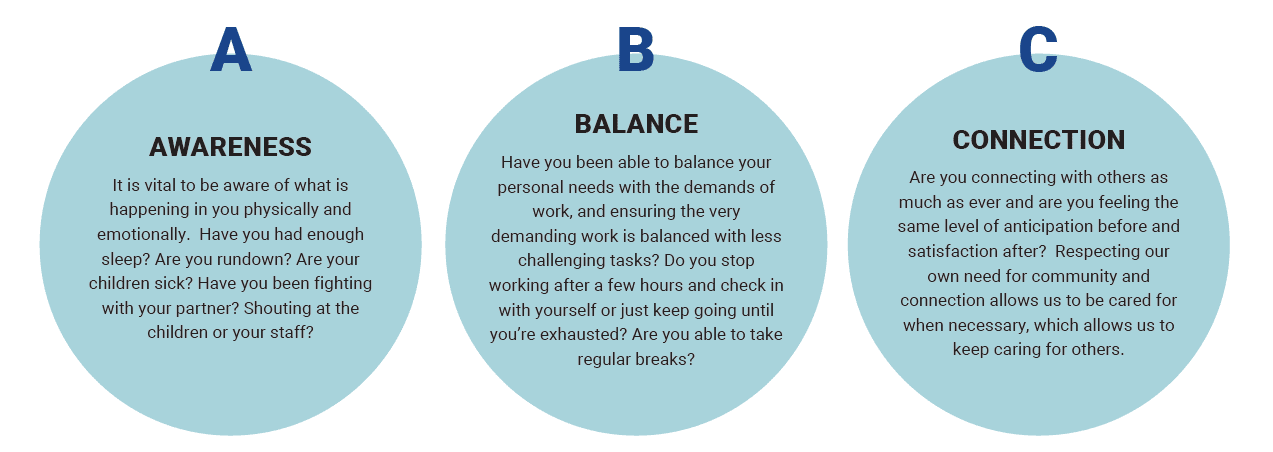What is vicarious trauma?
Vicarious trauma is a process of adverse change that occurs over time to people through repeated exposure (witnessing or hearing about) to other people’s suffering and needs. It occurs over time and is the cumulative effect of contact with people who are survivors of traumatic events and being compelled to help them.
This process has two parts, it is both a consequence of caring about others and their pain AND feeling a need and/or responsibility to help alleviate their suffering. It is different to empathy, which is relating to and understanding others experiences and their responses in a compassionate and thoughtful way. It is borne of a sense of commitment to the people being served and a determination to help ease their suffering. When such committed people feel like they are unable to meet that need, they can begin to feel overwhelmed, burdened, resentful and start to lose hope.
It can occur in anyone who works or interacts with people in pain, those in desperate situations or need ongoing support after experiencing traumatic events, including health professionals, volunteers and carers.

Signs and Symptoms
- Feeling off, like you can’t connect to others or feel good about yourself – it can feel like you’re playing a part in a play and not being “in” your life
- Personality changes – feeling mean or cynical
- Misplaced guilt at your own good fortune
- Feeling like your emotions are out of control
- Relationship problems
- Physical issues
- aches and pains
- getting ill more often
- being more clumsy
- Difficulty making good decisions
- A feeling of disconnection to what is important and a loss of meaning and hope in life
- Difficulty managing boundaries – taking on too much, feeling responsible for things that our not your responsibility, taking on other’s problems as your own.
- Increasing substance use or commencing substance use (taking up smoking).
This information has been designed for health professionals
Donate via PAYPAL Today
Visit our Paypal donation page to give a one-off donation. Donations are tax-deductible and you will receive a receipt for your as soon as it is processed.
Related Links
How to go about seeking help
First, check on your abc’s (Awareness, Balance and Connection).


It is vital to be aware of what is happening in you – physically and emotionally. Have you had enough sleep? Are you rundown? Are your children sick? Have you been fighting with your partner? In short, is there an external reason for how you are feeling?
Have you been able to balance your personal needs with the demands of work, and ensuring the very demanding work is balanced with less challenging tasks? Do you stop working after a few hours and check in with yourself or just keep going until you’re exhausted? Do you ensure you take regular breaks?
Are you connecting with others as much as ever and are you feeling the same level of anticipation before and satisfaction after? Respecting our own need for community and connection allows us to be cared for when necessary, which allows us to keep caring for others.
Some helpful tips to maintain mental health:
- Escape – make sure to take time for yourself unrelated to work – physically or mentally. Read books, listen to podcasts (note; not related to trauma), talk to friends about things other than work. Mindfulness apps, Mood tracking apps like woebot are a good way to monitor your mood over time to see if this is changing subtly, beneath your consciousness.
- Rest – allow yourself to do things with no expectation (non-goal directed activity). Go for a walk with no destination, nap during the day, sip a cup of tea mindfully, get a massage, have a bath.
- Play – Look at your current activities and decide which are nurturing and which are depleting e.g., reading to your children might feel nurturing, while cleaning may not feel nurturing. Be sure to do more of the nurturing activities than depleting ones.
- Be honest – sometimes people helping others feel they must meet every need presented. If you start feeling dread, discomfort, despair or annoyance this needs to be respected as a sign that you may start to be experiencing trauma.
Where to get help
- Peer supervision – the process of reflection on your experience in a safe and respectful way can help us process and contextualise the discomfort experienced
- ABTA Peer2Peer Support Program
- Speak to your GP – perhaps ask for a Mental health Care Plan to allow you to speak to a professional about your experience
- Phone counselling service
- Peer support through online forums may normalise your experience.






